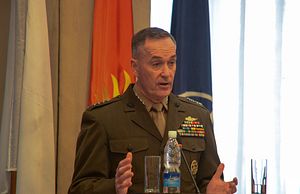Just six months after becoming the commandant of the Marine Corps, General Joseph Dunford, once commander of all coalition forces in Afghanistan, is on the verge of another big promotion. On Tuesday, President Obama is expected to nominate Dunford, considered by some to be one of the brightest officers in the Marine Corps, to replace retiring Army Gen. Martin Dempsey as Chairman of the Joint Chiefs of Staff. After the formal announcement of his nomination by the White House and after being confirmed by the U.S. Senate, Dunford will ascend to the top ranking military role in the United States.
According to a report in Defense News, Dunford pulled past Air Force Chief of Staff Gen. Mark Welsh and U.S. Pacific Command chief Admiral Samuel Locklear to get the nod. Welsh’s candidacy had been dogged by concerns that the Air Force had not responded forcefully enough to sexual assault in the service, while Locklear’s name circulated in a bribery investigation that landed several Navy officers in jail. Locklear is expected to be cleared of any involvement when a Justice Department inquiry into the matter concludes later this year.
Dunford, who would become the second Marine to win the job if confirmed by the Senate, carries none of that baggage. Joining him on the staff as vice chair would be Air Force Gen. Paul Selva, who currently heads up U.S. Transportation Command, the chief logistics shop in the military. Both have close ties to the Executive Branch: Obama and Dunford worked together to oversee the withdrawal of thousands of American troops from Afghanistan last year, and Selva served as a military adviser to then-Secretary of State Hillary Clinton when she was in Foggy Bottom.
Dunford would provide some continuity, particularly as U.S. troops continue the training and advising of the Afghan National Army (ANA) and Afghan National Security Forces (ANSF) through 2015, a mission that he’s intimately familiar with. The Senate confirmation process, Dunford’s second in as many years, is not expected to be challenging: before his turn in Kabul, the U.S. Army War College graduate served as assistant commandant of the Marines and deputy commandant for plans, policies, and operations at the Pentagon, the key interlocutor between the amphibious force and the joint staff.
He will inherit a leading role in the direction of the military services at a critical time. Defense Secretary Ashton Carter has argued that combat readiness is in dire shape: in 2015, 60 percent of Army trainings will top out at the squad level (commands of around nine troops), and it could take until 2020 for the Army, Navy, and Marines to be ready for theater warfare once again. It will take even more time for the Air Force to get back into fighting shape. Dunford will also have a key strategic role in shaping the U.S.-led air campaign against the Islamic State, and play a part in implementing the Pentagon’s new cyber security strategy, unveiled by Carter at Stanford University last month. If any of those boxes can get checked, expediting the “rebalance” to Asia could also be on the table.
That’s a tall order, and Dunford may have just less than two years to make a dent. But the Marine general boasts an impressive reputation in Washington, and enjoys a strong relationship with Obama from their collaboration in Afghanistan last year. That alone would be a tremendous asset for Dunford as he takes on the role.

































